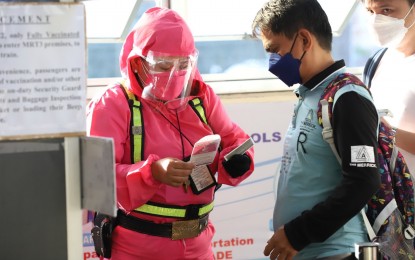
VAX CARD CHECK. A passenger of the Metro Rail Transit-3 Quezon Avenue station in Quezon City brings out his vaccination card as a requirement for boarding on Tuesday (Jan. 18, 2022). Only vaccinated individuals with a physical or digital copy of their vaccination cards and a valid identification with photo are allowed to ride in public transportation while the unvaccinated must show proof of exemption, like medical or employment certificates. (PNA photo by Robert Oswald P. Alfiler)
MANILA – The government has sufficient basis to enforce policies restricting the movement of persons who are unvaccinated against Covid-19.
Department of Justice (DOJ) Secretary Menardo Guevarra said on Tuesday such measures are in effect only in areas where the alert level is high and not where vaccines could be unavailable.
“These measures are time-bound and are not meant to be adopted in places with very low vaccination rates,” Guevarra said in a text message.
He also clarified there is no restrictions on travel for unvaccinated persons, “just restrictions on access to public transportation or common carriers, subject to well-defined exceptions”.
“More than three out of four who get hospitalized are unvaccinated and more than three out of four who die of Covid-19 are unvaccinated. The unvaccinated are not absolutely prohibited from availing themselves of public transport, provided that they have passes to show that they are out to obtain essential goods and services, such as food and medicine, or that they have medical certifications showing that they could not be vaccinated for medical or health reasons,” Guevarra explained.
Guevarra said while public transport is open for everyone, operators of common carriers “are bound to carry their passengers safely to their destinations, and safely means freedom not only from accidental injury but also from transmissible diseases”.
The DOJ chief also said Public Attorney’s Office (PAO) chief Persida Rueda- Acosta is within her rights not to be vaccinated as no law makes inoculation against Covid-19 mandatory.
Acosta said in a television interview Monday that she is having “second thoughts” and will wait for a protein-based vaccine which, according to the World Health Organization, uses harmless fragments of proteins or protein shells that mimic the Covid-19 virus to safely generate an immune response.
The current jabs in use are either viral vector vaccines, which use a safe virus that cannot cause disease but serves as a platform to produce coronavirus proteins to generate an immune response, or ribonucleic acid that generates a protein that itself safely prompts an immune response.
“To that extent, PAO chief Acosta has the legal right to refuse vaccination. but the state has the power to regulate the movement of unvaccinated persons if it deems that such regulation is in the interest of public health or public safety and is for the benefit not only of the vaccinated but also of the unvaccinated,” Guevarra said.
He said a person who refuses to get vaccinated for personal reasons is “duty-bound to obey reasonable state regulations affecting unvaccinated persons for the benefit of society at large”. (PNA)
